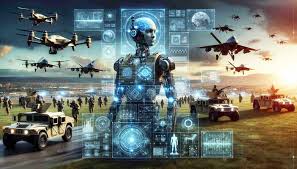Artificial Intelligence in Defense Systems
✅ Introduction
Artificial Intelligence (AI) in defense refers to the use of machine learning, robotics, data analytics, and autonomous systems to enhance military capabilities, reduce human risk, and make defense operations more efficient and intelligent.
🧠 Key Applications of AI in Defense
1. Surveillance and Reconnaissance
-
AI processes data from drones, satellites, and sensors to detect threats.
-
Identifies enemy movements, unusual activities, or hidden weapons.
-
Uses image recognition and facial detection technologies.
2. Autonomous Weapons and Vehicles
-
AI powers Unmanned Aerial Vehicles (UAVs), ground robots, and marine drones.
-
Used for tasks like patrolling, surveillance, and even combat.
-
Capable of making decisions like targeting or navigating without human input.
3. Cybersecurity and Information Warfare
-
AI detects and neutralizes cyber threats in real time.
-
Predicts and prevents cyberattacks on critical infrastructure.
-
Automates threat analysis and intrusion detection.
4. Command and Decision Support
-
AI helps commanders in battlefield decision-making by analyzing real-time data.
-
Simulates combat scenarios, forecasts enemy actions, and suggests optimal responses.
-
Reduces decision-making time and improves strategic planning.
5. Logistics and Supply Chain Management
-
AI optimizes the movement of troops, fuel, and equipment.
-
Predictive maintenance of vehicles and machinery.
-
Ensures timely resupply and readiness in battlefield conditions.
6. Training and Simulation
-
AI-driven simulations prepare soldiers using virtual reality (VR) and augmented reality (AR).
-
Creates realistic combat environments for training.
-
Improves readiness and decision-making skills.
7. Electronic Warfare
-
AI helps detect and jam enemy communications or radar signals.
-
Used in signal intelligence (SIGINT) and electronic countermeasures (ECM).
📈 Benefits of AI in Defense
-
Faster decision-making
-
Reduced human casualties
-
Better accuracy and efficiency
-
24/7 operation capabilities
-
Cost savings in long-term operations
⚠️ Challenges and Concerns
-
Ethical issues: autonomous weapons and civilian safety.
-
Security risks: hacking and AI misuse. -
Reliability: potential for errors or misidentification.
-
Legal implications: international law and rules of war.
🛡️ Conclusion
AI is revolutionizing defense systems by making them smarter, faster, and more autonomous. While it offers vast strategic advantages, it also raises ethical and security challenges that require careful governance.







.jpg)


